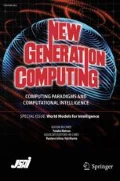Abstract
A ‘process theory’ is any theory of systems and processes which admits sequential and parallel composition. ‘Terminality’ unifies normalisation for pure states, trace-preservation for positive superoperators, and adding up to identity of positive operators in quantum theory, and it moreover generalises this to arbitrary process theories. We show that terminality and no-signalling coincide in any process theory, provided one makes causal structure explicit. In fact, making causal structure explicit is necessary to even make sense of no-signalling in process theories. We conclude that because of its much simpler mathematical form, terminality should be taken to be a more fundamental notion than no-signalling. We also point out that terminality imposes many other nice features upon process theories, for example, it even imposes relativistic covariance.
Similar content being viewed by others
References
Abramsky, S. and Coecke, B., “A categorical semantics of quantum protocols,” in Proc. of the 19th Annual IEEE Symposium on Logic in Computer Science (LICS), pp. 415–425, 2004, arXiv:quant-ph/0402130.
Barrett J.: “Information processing in generalized probabilistic theories,”. Physical Review A 75, 032304 (2007)
Blute R. F., Ivanov I. T., Panangaden P.: “Discrete quantum causal dynamics,”. International Journal of Theoretical Physics, 42(9), 2025–2041 (2003)
Chiribella G., D’Ariano G. M., Perinotti P.: “Probabilistic theories with purification,”. Physical Review A 81(6), 062348 (2010)
Chiribella G., D’Ariano G. M., Perinotti P.: “Informational derivation of quantum theory,”. Physical Review A 84(1), 012311 (2011)
Coecke, B., “Kindergarten quantum mechanics,” in Quantum Theory: Reconsiderations of the Foundations III (Khrennikov, A. ed.), pp. 81–98, AIP Press, 2005, arXiv:quant-ph/0510032.
Coecke, B., “A universe of processes and some of its guises,” in Deep Beauty: Understanding the Quantum World through Mathematical Innovation (Halvorson, H. ed.), pp. 129–186, Cambridge University Press, 2011, arXiv:1009.3786.
Coecke, B. and Kissinger, A., “Categorical quantum mechanics I: Causal quantum processes,” in Categories for the Working Philosopher (Landry, E. ed.), Oxford University Press, 2016.
Coecke, B. and Kissinger, A., Picturing Quantum Processes. A First Course in Quantum Theory and Diagrammatic Reasoning, Cambridge University Press, 2016.
Coecke, B. and Lal, R., “Time asymmetry of probabilities versus relativistic causal structure: An arrow of time,” Physical Review Letters, 108, 200403, May, 2012.
Coecke, B. and Lal, R., “Causal categories: relativistically interacting processes,” Foundations of Physics, 43, pp. 458–501, 2013, arXiv:1107.6019.
Fritz, T., “Beyond Bell’s theorem II: Scenarios with arbitrary causal structure,” arXiv:1404.4812, 2014.
Henson, J., Lal, R. and Pusey, M. F., “Theory-independent limits on correlations from generalised Bayesian networks,” arXiv:1405.2572, 2014.
Markopoulou F.: “Quantum causal histories,”. Classical and Quantum Gravity 17(10), 2059–2072 (2000)
Pearl, J., Causality: Models, Reasoning and Inference, Cambridge University Press, 2000.
Penrose, R., Techniques of Differential Topology in Relativity, SIAM, 1972.
Selinger P.: “Dagger compact closed categories and completely positive maps,”. Electronic Notes in Theoretical Computer Science 170, 139–163 (2007)
Wood, C. J. and Spekkens, R. W., “The lesson of causal discovery algorithms for quantum correlations: causal explanations of Bell-inequality violations require fine-tuning,” arXiv:1208.4119, 2012.
Author information
Authors and Affiliations
Corresponding author
About this article
Cite this article
Coecke, B. Terminality Implies No-signalling ...and Much More Than That. New Gener. Comput. 34, 69–85 (2016). https://doi.org/10.1007/s00354-016-0201-6
Received:
Revised:
Published:
Issue Date:
DOI: https://doi.org/10.1007/s00354-016-0201-6




